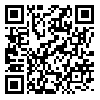Volume 6, Issue 1 (8-2019)
J Prevent Med 2019, 6(1): 9-3 |
Back to browse issues page
Download citation:
BibTeX | RIS | EndNote | Medlars | ProCite | Reference Manager | RefWorks
Send citation to:



BibTeX | RIS | EndNote | Medlars | ProCite | Reference Manager | RefWorks
Send citation to:
Eshghi F, Bostani S. The effect of gentle human touch on behavioral states in preterm infants. J Prevent Med 2019; 6 (1) :9-3
URL: http://jpm.hums.ac.ir/article-1-330-en.html
URL: http://jpm.hums.ac.ir/article-1-330-en.html
1- 1. Student Research Committee, School of Nursing and Midwifery, Shahid Beheshti University of Medical Sciences, Tehran, Iran
2- MSC, Medical Surgical Nursing, Faculty of Nursing and Midwifery, Shiraz University of Medical Sciences, Shiraz, Iran.
2- MSC, Medical Surgical Nursing, Faculty of Nursing and Midwifery, Shiraz University of Medical Sciences, Shiraz, Iran.
Abstract: (5267 Views)
Introduction: Due to rapid advance in medical technologies and nursing care, survival rate of preterm infants has significantly increased. Since compensation sensory stimulation that infant receive during intrauterine period can promote preterm infants maturation, this study was conducted to determine the effect of gentle human touch on behavioral states in preterm infants.
Methods: This interventional study was performed on 60 preterm infants with 26-34 gestational age that hospitalized in Neonatal Intensive Care Unit (NICU) of Afzalipour hospital Kerman, Iran. Samples were randomly selected and divided into two groups (intervention and control groups). Neonates in Interventional group received Gentle Human Touch for 15 min twice a day for 5 days and using the Anderson Behavior State Scale, infants behavioral states (ABSS) were measured in before and after the intervention. Data were analyzed using SPSS software and combined model.
Results: Mean scores of ABSS in preterm infants of the intervention and control groups were
4.85±0.14 and 10.63±0.14, respectively. There was a significant difference between the scores of ABSS between the gentle touch and control groups after the intervention (P-Value<0/001).
Conclusion: The finding suggest that GHT could be an effective method for increasing sleep state, decreasing fussy state, and reducing the effects of stressors in NICU.
Methods: This interventional study was performed on 60 preterm infants with 26-34 gestational age that hospitalized in Neonatal Intensive Care Unit (NICU) of Afzalipour hospital Kerman, Iran. Samples were randomly selected and divided into two groups (intervention and control groups). Neonates in Interventional group received Gentle Human Touch for 15 min twice a day for 5 days and using the Anderson Behavior State Scale, infants behavioral states (ABSS) were measured in before and after the intervention. Data were analyzed using SPSS software and combined model.
Results: Mean scores of ABSS in preterm infants of the intervention and control groups were
4.85±0.14 and 10.63±0.14, respectively. There was a significant difference between the scores of ABSS between the gentle touch and control groups after the intervention (P-Value<0/001).
Conclusion: The finding suggest that GHT could be an effective method for increasing sleep state, decreasing fussy state, and reducing the effects of stressors in NICU.
Type of Study: Orginal |
Subject:
Special
Received: 2019/01/28 | Accepted: 2019/03/16 | Published: 2019/03/16
Received: 2019/01/28 | Accepted: 2019/03/16 | Published: 2019/03/16
Send email to the article author
| Rights and permissions | |
 |
This work is licensed under a Creative Commons Attribution-NonCommercial 4.0 International License. |







 hums.ac.ir
hums.ac.ir